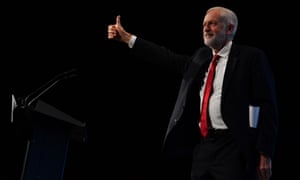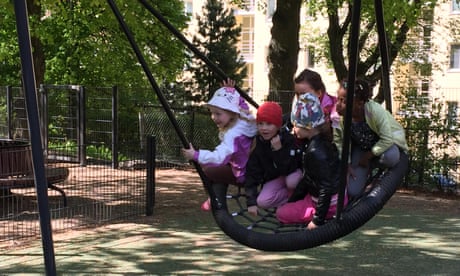
Pupils at Harrow school, London: ‘Removing charitable status is rightly no longer seen as radical.’ Photograph: Alamy Stock Photo
A few years back, I finished a PhD on how to tackle Britain’s unequal life chances – which, among other measures, included abolishing private schools. Dusty academia seemed the home for this sort of proposal, one that has long filled endless papers but never quite makes it off the page and into reality.
That is no longer the case. In a few days, the Labour party will debate the future of private schools. The grassroots group Labour Against Private Schools (Laps) will bring a motion to the annual party conference in Brighton calling for the full integration of state and private schools, including nationalising the endowments of the hugely wealthy public schools. It has support from six constituency parties so far and the backing of senior party figures, with the shadow chancellor, John McDonnell, putting his weight behind the motion this week. A leaked memo to the Telegraph last week noted that the party is already considering making a manifesto pledge to remove tax breaks from the sector – while leaving the door open to getting rid of the schools altogether.
Removing charitable status is rightly no longer seen as radical. In 2017, that well-known lefty Michael Gove declared that private schools were “welfare junkies”, calling the VAT exemption “egregious state support to the already wealthy so that they might buy advantage for their own children”. The classic argument that private schools deserve tax breaks because they provide bursaries to poorer children is as thin as paper: in 2017, only 1% of private school pupils were schooled for free, while figures show “financial assistance” is considerably more likely to go to affluent middle-class families than children in need.
A few years back, I finished a PhD on how to tackle Britain’s unequal life chances – which, among other measures, included abolishing private schools. Dusty academia seemed the home for this sort of proposal, one that has long filled endless papers but never quite makes it off the page and into reality.
That is no longer the case. In a few days, the Labour party will debate the future of private schools. The grassroots group Labour Against Private Schools (Laps) will bring a motion to the annual party conference in Brighton calling for the full integration of state and private schools, including nationalising the endowments of the hugely wealthy public schools. It has support from six constituency parties so far and the backing of senior party figures, with the shadow chancellor, John McDonnell, putting his weight behind the motion this week. A leaked memo to the Telegraph last week noted that the party is already considering making a manifesto pledge to remove tax breaks from the sector – while leaving the door open to getting rid of the schools altogether.
Removing charitable status is rightly no longer seen as radical. In 2017, that well-known lefty Michael Gove declared that private schools were “welfare junkies”, calling the VAT exemption “egregious state support to the already wealthy so that they might buy advantage for their own children”. The classic argument that private schools deserve tax breaks because they provide bursaries to poorer children is as thin as paper: in 2017, only 1% of private school pupils were schooled for free, while figures show “financial assistance” is considerably more likely to go to affluent middle-class families than children in need.
It’s exciting, then, that the conversation is no longer restricted to this. For decades, private schools have held an untouchable air in this country. We know very well the damage they cause – both to the children whose education is harmed by losing advantaged peers and their influential parents, and to a society that is stifled by positions of power handed out on the basis of wealth rather than talent. We know how bizarre this set-up is – that 7% of schoolchildren will go on to control much of the media, the judiciary and parliament. And yet it is greeted with borderline rabid resistance by many commentators, while even those on the left have been reluctant to argue for comprehensive solutions. It typifies the worst of class privilege, where a small section of society is permitted to buy power and influence despite all the evidence of the damage that causes, and the rest of us must shrug our shoulders and accept this as an inevitability.
What feels different now is that these ideas are becoming mainstream at a tipping point in this country. Years of austerity have highlighted the resources gap between the highly funded private sector and the starved state sector. When many working-class children don’t have basic equipment in class, the dominance of elite schools feels even more obscene. The calamity of Eton alumni taking their turn at Downing Street, meanwhile, is now a real-time display of how dysfunctional a nation becomes when structured to be forever run by a tiny pocket of the wealthy.
The abolition of private schools is not an outlandish idea but rather an extension of what we already do. Societies constantly set limits on how far a parent can go in giving their child an advantage in life – that’s why it’s illegal for a mother to bribe a university admissions officer to give her son a place, and unethical for a father to do his daughter’s GCSE coursework. This is because it is widely understood that no matter how natural a parent’s desire to do the best for their child, it does not trump the good of society. Other countries, such as Finland, have already acted on this by slowly merging private and state schools.
When many working-class children don’t have basic equipment in class, the dominance of elite schools feels even more obscene
That the recent Telegraph front page had to rely on the retro “politics of envy” accusation to describe Labour’s ideas – akin to a playground cry of “You’re just jealous!” – shows how weak critics’ arguments are. In an era in which the damage of inequality is ever clearer and the movements to tackle it are growing stronger, those who cannot comprehend a desire to make life fairer for other people’s children sound increasingly out of touch.
It’s clear that tackling private schools alone is not enough to level the playing field, but that there are multiple causes of inequality doesn’t seem a good argument to ignore one of them.
The protection of a two-tier school system comes down to a fundamental question about what we think education should be. If we want the education system to be about giving every child a fair shot, then merging state and private schools is the logical move. The question is: what is really stopping our children being educated together?


